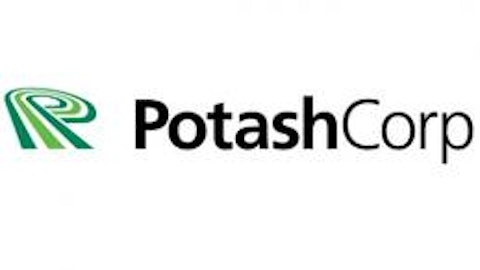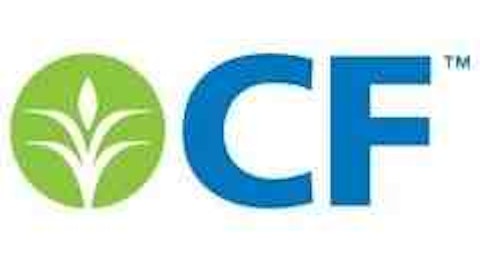One of the most successful investors most people have never heard of is named Hetty Green. In an age when women couldn’t even vote, she turned a nice inheritance into one of the country’s largest fortunes. How? She explained in a 1905 interview:
I buy when things are low and no one wants them. I keep them until they go up and people are anxious to buy. That is the general rule of business success.
Today, Hetty might have been interested in fertilizer, or crop-nutrient, stocks. Here’s a take on some of the companies and why they might be a worthwhile investment consideration.
Why no one wanted them
Large Russian producer Uralkali Group sent fertilizer stocks reeling when it pulled out of one of two major selling cartels and threatened to ramp up production. Uralkali warned it could boost its output of potash, a key crop-nutrient used to strengthen plant roots, which might cause prices to fall significantly. Since the two consortiums, one North American-based and the one formerly including Uralkali, are thought to control about 80% of the world’s potash production, the fraying of a stable pricing environment begets worry about potential industry sales and earnings declines.
Why things might not be so bad
Even though the immediate market reaction to the Uralkali news was dire, with some fertilizer stocks falling close to 30%, the end result for the industry might not be so bad. For one thing, strong global demand for crop nutrients is expected to continue. Farmers continually need to improve soil fertility and food production thanks to a growing world population. Plus, opportunities to increase arable land are limited. So it is imperative that crop yields increase on the already-producing fields.
There are also questions about the long-term effects of Uralkali’s decision. The company has little to gain from severely distorting world potash pricing. In 2010, it doubled its size in a $7.8 billion acquisition, funded by $1.6 billion in bonds and 1.2 billion newly issued shares. It would seem unlikely that Uralkali would want to inflict long-term financial hurt on itself when it recently added such a burden. A burden that grew heavier with a recent $1.3 billion share repurchase funded by additional debt.
Finally, the uncertainty also seems to hinder any hurtful industry expansion. Global mining power BHP Billiton now has a much tougher decision about whether to go ahead with its long-delayed $14 billion Canadian potash project. Especially after fellow mining giant Vale pulled out of a large project scheduled in Argentina and a planned mine in Great Britain by Sirius Minerals seems to be stumbling.
Some seemingly “on sale” industry participants

Even though results weren’t great, the company is optimistically expanding plant capacity in Louisiana and Iowa thanks to the benefits of cheap and stable North American natural gas, which greatly aids CF Industries Holdings, Inc. (NYSE:CF)’s position in the nitrogen market.
The company’s shares may be attractive. Using a cash earnings times a capitalization multiplier valuation, fair business value would be around $250 a share at a 10 times historical multiple. This is based on normalized company sales at around $5.6 billion, cash earnings of approximately $1.6 billion, and a cash profit margin at near 28.2%.
Mosaic Co (NYSE:MOS) is another leading producer and marketer of crop nutrients. It recently reported net earnings of $486 million, compared to $507 million a year ago, and net sales of $2.7 billion, down from $2.8 billion last year. Though Mosaic Co (NYSE:MOS) set a potash sales record and had strong phosphate sales, they were more than offset by lower realized pricing.
Sales of potash came in at $1.0 billion, 37% of total revenue and flat versus 2012, as record shipments were diluted by lower prices. Potash production was up a whopping 32% to 2.5 million tons. Sales of phosphates were $1.7 billion, down 7% from 2012, primarily driven by weaker selling prices. Volumes were 2.9 million tons, roughly flat to last year.
With an estimated fair value of around $61 at a historical 16 times multiple, Mosaic Co (NYSE:MOS) shares might currently be excessively discounted if the company can come anywhere near normalized revenue of near $9.6 billion, cash earnings of $1.6 billion, and a cash profit margin of around 17.0%.
Potash Corp./Saskatchewan (USA) (NYSE:POT) is the world’s largest producer, by capacity, of potash and third-largest producer of nitrogen and phosphate. In its last quarter, earnings came in at $643 million versus $738 million in 2012. Revenue was $2.1 billion, down from $2.4 billion.
The company’s potash sales were $907 million, 43% of total sales, and down 20% compared to 2012 mainly due to a damaging 18% decline in pricing and a small drop in volume. Nitrogen sales of $602 million, around 29% of all revenue, fell about 3%. Sales volumes were 1.4 million tons, slightly up from 2012, but average-selling prices deteriorated around 7%.
Potash Corp./Saskatchewan (USA) (NYSE:POT)’s current share price looks fairly alluring. At normalized sales of around $7.6 billion, cash earnings of $2.0 billion, and a cash profit margin close to 27.0%, the company’s reasonable business value is about $38 a share at a historical 16 times multiple.
Conclusion
Fertilizer stocks recently took quite a beating, but if the attractive long-term attributes of the industry are valid, it might just be a profitable opportunity to, as Hetty Green put it, “buy when things are low and no one wants them and keep them until people are anxious to buy.”
The article Can Fertilizer Stocks Make You Some Green? originally appeared on Fool.com and is written by Bob Chandler.
Bob Chandler has a long position in CF Industries, Mosaic, and Potash Corp. The Motley Fool owns shares of CF Industries Holdings.
Bob is a member of The Motley Fool Blog Network — entries represent the personal opinion of the blogger and are not formally edited.
Copyright © 1995 – 2013 The Motley Fool, LLC. All rights reserved. The Motley Fool has a disclosure policy.




